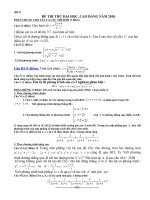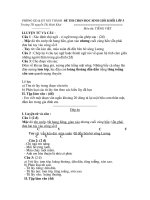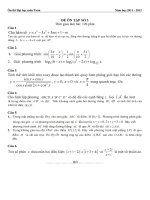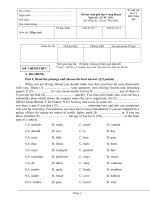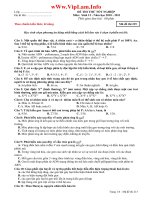đề thi thử tiếng anh số 5 có đáp án
Bạn đang xem bản rút gọn của tài liệu. Xem và tải ngay bản đầy đủ của tài liệu tại đây (120.23 KB, 7 trang )
ĐỀ SỐ 6
* Mark the letter A, B, C, or D on your answer sheet to indicate the word whose underlined part differs
from the other three in pronunciation in each of the following questions.
Question 1: A. police
B. pollute
C. policy
D. polite
Question 2: A. sympathy
B. rose
C. grease
D. horse
* Mark the letter A, B, C, or D on you answer sheet to indicate the word that differs from the rest in the
position of the main stress in each of the following questions.
Question 3: A. community B. circumstance
C. identity
D. considerate
Question 4: A. headhunt
C. high-flyer
D. workforce
B. handshake
* Mark the letter A, B, C, or D on your answer sheet to indicate the correct answer to each of the
following questions.
Question 5: Young children often miss out
the nutrition needed for their growing
bodies, as well as the education necessary for their expanding minds.
A. of
B. on
C. in
D. to
Question 6: We are all very sorry that we have to wait for this agreement to come into
A. truth
B. action
Question 7: I couldn't go into my own
problems.
A. imaginary
Question 8: Never
C. force
D. reality
world far away and try to block out all of these
B. imaginatively
more people
C. imaginable
_ in charity work than now.
A. do/ participate
B. have/ participated
C. did/ participate
D. had/ participated
Question 9: The A.I. expert wanted to have his assistant
A. activate
B. activated
.
D. imaginative
the newly made robot.
C. activating
D. to activate
Question 10: If children are enjoying themselves and having fun during the activities, this is
an indication that they feel at
A. crease
Question 11: Her
aspects she objected to.
A. standard
with the methods being used.
B. ease
C. release
D. peace
impression of the school was positive, but there were a few
B. complete
C. overall
Question 12: The message was often enhanced by a
attention of children.
A. light-minded
B. light-headed
D. wide
drawing specifically to attract the
C. light-footed
D. light-hearted
Question 13: She
forher parents’ support during her university education, but she prefered to
work part-time and support herself.
A. could have asked
B. should have asked
C. ought to ask
D. must have asked
Question 14: “What did Maria ask you?”
“She asked me
A. that
B. for
Question 15: Emma and Karen used to be
I had ever been abroad.”
C. whether
D. about
good friends that I’m surprised they don’t get on now.
Hoctai.vn - Webiste chia sẻ Tài liệu, Đề + Thi Online miễn phí có lời giải chi tiết.
Facebook: />
A. such
B.enough
C. so
Question 16: During the course, you will be given a test
D. too
other week and a final
exam at the end.
A. some
B. either
C. several
D. every
* Mark the letter A, B, C, or D on your answer sheet to indicate the most suitable response to complete
each of the following exchanges.
Question 17: “Do you fancy a drink?” –“
”
A. No, everything is OK.
B. Oh! Of course not.
C. Sure, let’s go and get one
D. Wow! I am so excited.
Question 18: - Nam: I’m planning to raise a couple of rabbits at home.
- Lan:
.
A. That’s a good idea.
B. Rabbits are very fast.
C. I’ve never seen rabbits before.
D. I’ve decided to raise a cat.
* Mark the letter A, B, C, or D on your answer sheet to indicate the sentence that best combines each
pair of sentences in the following questions.
Question 19: Sacred texts and ceremonies can seem confusing with no one there to guide. Young people
find an expert willing to explain their significance.
A. Although sacred texts and ceremonies can seem confusing with no one there to guide, young people
are forced to find an expert willing to explain their significance.
B. Since sacred texts and ceremonies can seem confusing with no one there to guide, young people are
supposed to find an expert willing to explain their significance.
C. For sacred texts and ceremonies can seem confusing with no one there to guide, young people might
find an expert willing to explain their significance.
D. Because sacred texts and ceremonies can seem confusing with no one there to guide, so young
people are willing to find an expert willing to explain their significance.
Question 20:1 find it very challenging. It requires a lot of concentration and determination.
A. I find it very challenging, for it requires a lot of concentration and determination.
B. I find it very challenging, so it requires a lot of concentration and determination.
C. I find it very challenging, yet it requires a lot of concentration and determination.
D. I find it very challenging, though it requires a lot of concentration and determination.
* Mark the letter A, B, C, or D on your answer sheet to indicate the sentence that is closest in meaning
to each of the following questions.
Question 21: He was so addicted to social networks that he quitted all other outdoor activities.
A. He was not addicted enough to quit all other outdoor activities.
B. He had quitted all other outdoor activities before he became addicted to social networks.
C. The social networks are too addictive for him to quit all other outdoor activities.
D. He was such an addict to social networks that he quitted all other outdoor activities.
Question 22: Immediately after his arrival home a water-heater exploded.
A. Hardly had he arrived home than a water-heater exploded.
B. No sooner had he arrived home than a water-heater hadexploded.
C. Hardly had he arrived home when a water-heater exploded.
D. Scarcely he arrived home when a water-heater exploded.
Question 23: I haven’t got used to Indian food although I have lived here for three months.
A. Eating Indian food is one of the habits when I lived in Indian three months ago.
B. Because I still live in India, I find Indian food strange to eat.
C. I have to eat Indian food to get used to eat as I have to live in India.
D. I still find it strange to eat Indian food though I have lived here for three months.
* Read the following passage and mark the letter A, B, C, or D on your answer sheet to indicate the
correct answer to each of the questions from 24 to 30.
Almost all living things ultimately get their energy from the sun. In a process called photosynthesis,
plants, algae, and some other organisms capture the sun's energy and use it to make simple sugars such as
glucose. Most other organisms use these organic molecules as a source of energy. Organic materials
contain a tremendous amount of energy. As food, they fuel our bodies and those of most other
creatures. In such forms as oil, gas, and coal, they heat our homes, run our factories and power our cars.
Photosynthesis begins when solar energy is absorbed by chemicals called photosynthetic pigments that
are contained within an organism. The most common photosynthetic pigment is chlorophyll. The bright
green color characteristic of plants is caused by it. Most algae have additional pigments that may mask
the green chlorophyll. Because of these pigments, algae may be not only green but brown, red, blue or
even black.
In a series of enzyme-controlled reactions, the solar energy captured by chlorophyll and other pigments
is used to make simple sugars, with carbon dioxide and water as the raw materials. Carbon dioxide is one
of very few carbon- containing molecules not considered to be organic compounds. Photosynthesis then
converts carbon from an inorganic to an organic form. This is called carbon fixation. In this process,
the solar energy that was absorbed by chlorophyll is stored as chemical energy in the form of simple
sugars like glucose. The glucose is then used to make other organic compounds. In addition,
photosynthesis produces oxygen gas. All the oxygen gas on earth, both in the atmosphere we breathe
and in the ocean, was produced by photosynthetic organisms. Photosynthesis constantly replenishes the
earth's oxygen supply.
Organisms that are capable of photosynthesis can obtain all the energy they need from sunlight and do
not need to eat. They are called autotrophs. Plants are the most familiar autotrophs on land. In the ocean,
algae and bacteria are the most important autotrophs. Many organisms cannot produce their own food and
must obtain energy by eating organic matter. These are called heterotrophs.
(Hooked on TOEFL Reading - LinguaForum)
Question 24. The word “fuel” in the first paragraph is similar in meaning to
A. give fuel to
B. produce organic materials
C. help to function
D. provide nutrients for
.
Question 25. Based on the information in paragraph 3, we can see that glucose
.
A. enables photosynthesis
B. is a byproduct of oxygen production
C. contains carbon
D. creates enzymes
Question 26. Which of the following is true about heterotrophs?
A. They require more energy than autotrophs.
B. They are not reliant on simple sugars for energy.
C. They cannot exist without the presence of autotrophs.
D. They are mostly land-bound organisms.
Question 27. The phrase “this process” in the third paragraph refers to the process of
A. storing chemical energy
B. photosynthesis
C. absorbing solar energy
D. carbon fixation
Question 28. It can be inferred from the passage that the author considers solar energy to be
.
.
A. useless to most bacteria and algae
B. a permanent and everlasting source of energy
C. a perfect solution to the energy problem
D. essential for every organism on earth
Question 29. Which of the following is NOT true?
A. Plants are familiar heterotrophs
B. Plants capture the sun's energy to make sugars.
C. Photosynthesis produces oxygen gas
D. Organic materials contain an amount of energy.
Question 30. From the passage, we can see that
.
A. Most plants have additional pigments
B. Algae are a kind of simple plants
C. Autotrophs obtain energy by eating organic matter
D. Oxygen helps the process of photosynthesis
* Read the following passage and mark the letter A, B, C or D on your answer sheet to indicate the
correct word or phrase that best fits each of the numbered blanks from 31 to 35.
A MORE COMMERCIAL TUNE
Roger Press, 40, has changed his career. After spending five years (31)
a concert pianist, he
has gone into business, recently setting up his own company.
myself to a career in music. I loved performing,
After leaving university I decided to (32)
but it was hard work. I played at concerts in Europe and America, made recordings and got reviews. But
after a while I felt I had gone as far as I could. Unless you’re one of the world’s top 20 pianists, it’s
difficult to earn a good living and I wasn’t one of the greatest.
When I gave up my performing career, people around me were more sad and disappointed than I was.
But I felt free and (33)_
I knew I was getting serious about life. After getting a qualification in
business administration I joined the recording company EMI and started their classical video division,
producing programmes about famous artists. A year ago I left EMI and formed a new company, New
Media Systems, which (34)
in multimedia programs.
(35)
I run my own business, I’m in control of my life and I feel proud of my achievements.
Although the stress is high and I work long hours, the stress involved in piano playing was much worse. It
took physical, emotional and mental skills. I prefer the pressures I live with now.
Question 31. A. like
Question 32. A. devote
Question 33. A. lastly
Question 34. A. specializes
Question 35. A. Although
* Mark the letter A, B, C, or D on your answer sheet to indicate the word(s) CLOSEST in meaning to
the underlined word(s) in each of the following questions.
Question 36: She was dumbfounded at this magical event, and stood there open mouthed for a
long time, looking at this strange object in her own hand.
A. speechless
B. astonished
C. content
D. applauding
Question 37: While this kind of weather may not be the most conducive to the playing of sports, for
the spectator it is a godsend.
A. that creates barrier for
B. that helps
C. that doesn’t make easier
D. that pays fee for
Mark the letter A, B, C, or D on your answer sheet to indicate the word(s) OPPOSITE in meaning to
the underlined word(s) in each of the following questions.
Question 38: While waiting at a gas station Simon and Mack strike up a friendship.
A. cover up
B. give up
C. make up
D. remain
Question 39: My father continued to work very hard, hoping to be promoted to the position of manager.
Finally, his hard work paid off and he was promoted.
A. paid in full
B. compensated
C. succeeded
D. failed
* Mark the letter A, B, C, or D on your answer sheet to show the underlined part that needs correction
in each of the following questions.
Question 40: The skin of mammals is a complexity organ that serves vital protective and metabolic
functions.
A. is
B. complexity organ
C. vital
D. metabolic functions
Question 41: Possibly the easiest and most enjovablv way to become a weather watcher is simply to
observe the clouds.
A. Possibly
B. easiest
C. enjoyably
D. to observe
Question 42: Before the cotton gin A. had been invented in 1794, American famers B. had cheap C.
salves remove seeds D. from the cotton fiber.
A. had been invented
B. had
C. salves
D. from
* Read the following passage and mark the letter A, B, C, or D on your answer sheet to indicate the
correct answer to each of the questions from 43 to 50.
“They told me I could never walk again. But when I listened to music, I forgot all about the pain. I
found the strength I didn’t know I had.”Ninety-two-year-old Tina Goodman, who regained her ability to
walk, thanks to music.
This is just one of the many stories in Fettaro’s book “The Healing Power of Music” . Fettaro tries to
show just how important music is in our lives and how it can help us to be healthy and happy.
According to Fettaro, music can make sick people again. In fact, his book comes with a CD of
recordings, each one specially designed to help with a number of health problems.
Fettaro, e well-known music therapist, promises that by reading his book, you will be able to develop
the healing power of music in your life. He says this will help you fight headaches and back pain, as well
as reduce stress, high blood pressure, and many other common illnesses.
Certainly, I accept that listening to certain types of music can help with particular problems, such as
stress. I am also comfortable with Fettaro’s claim that by reading his book, you’ll be able to create a
peaceful enviroment to help you relax in your home. I found the relaxation and breathing techniques very
useful. Similarly his claim that music help you sleep better seems reasonable. Yet when he goes on to
promise his music therapies will help cure depression and even cancer, he begins to sound a little bit
unbelievable.
Nevertheless, for those of you who are interested in the power of music to heal, this is a great book to
buy. It’s a thorough introduction to the history and practice of music therapy. Fettaro writes in a simple,
easy to understand way and shows clearly how music can affect us positively. His basic message-that
music can improve our lives-is well-presented and clear. It may even be true that certain techniques
covered here can help some people recover from unpleasant health problems. However, his promises of
“amazing results” seem impossible to justify.
Question 43: What was Tina Goodman’s problem?
A. stress
B. high blood pressure
C. disablement
D. headaches
Question 44: Which statement is not true?
A. Music can help you sleep better
B. Music has positive effects
C. It is necessary to create a peaceful enviroment when you read Fettaro’s book
D. The recordings accompanied with the book are to help with some health problems.
Question 45: What is the basic message of Fettaro’s book?
A. Music can make our lives better
B. No illness is incurable with the help of music
C. Music can cure even depression and cancer
D. Music brings amazing results
Question 46: What are the two techniques useful to the writer?
A. relaxing and peace-making ones
B. listening and reading
C. recovering and relaxing in your own home
D. relaxing and breathing ones
Question 47: Which is not stated by Fettaro as curable?
A. cancer
B. high blood pressure
C. back pain
D. sore throat
Question 48: What is the writer’s opinion of the book?
A. He likes the book a lot and recommends it to everyone
B. He likes the book but is not so happy about some of the promises it makes
C. He doesn’t like the book because few of the claim can be proved
D. He finds all claims impossible to be proved
Question 49: What is the meaning of the word “covered”?
A. included
B. paid
C. attended to
D. illustrated
Question 50: Which word is similar to the word “justify”?
A. attain
B. deny
C. believe
D. prove
